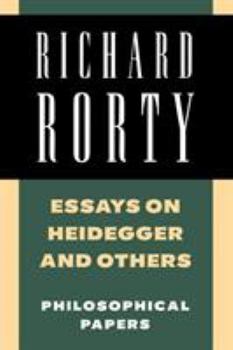Essays on Heidegger and Others: Philosophical Papers
(Part of the Philosophical Papers Series)
Select Format
Select Condition 
Book Overview
The second volume pursues the themes of the first volume in the context of discussions of recent European philosophy focusing on the work of Heidegger and Derrida. His four essays on Heidegger include Philosophy as Science, as Metaphor and as Politics and Heidegger, Kundera, and Dickens; three essays on Derrida (including Deconstruction and Circumvention and Is Derrida a Transcendental Philosopher?) are followed by a discussion of the uses to which Paul de Man and his followers have put certain Derridean ideas. Rorty's concluding essays broaden outward with an essay on Freud and Moral Deliberation and essays discussing the social theories and political attitudes of various contemporary figures--Foucault, Lyotard, Habermas, Unger, and Castoriadis.
Format:Paperback
Language:English
ISBN:0521358787
ISBN13:9780521358781
Release Date:February 1991
Publisher:Cambridge University Press
Length:212 Pages
Weight:0.79 lbs.
Dimensions:0.6" x 6.0" x 8.9"
Customer Reviews
3 ratings
Provocative connection-making
Published by Thriftbooks.com User , 23 years ago
This is a fascinating work wherein Rorty once again proves himself a master of the consolidation of varying ideas and philosophical tracts. Yes, he does borrow a lot of ideas/interpretations from "second source" philosophers, people like Okrent, but that shouldn't discourage potential readers: Rorty excels at making intricate and original connections -- networks of thought. Certainly, not all of his arguments are unassailable, but they are almost always provocative. The points he makes along the way are often as intriguing as the larger point he tries to make with the essay itself. Also, the print, as another reviewer has mentioned, is indeed somewhat small, but I wouldn't say it offers a significant problem as far as reading goes. Oddly, the print in another set of his "philosophical papers," that on Truth and Progress, is larger though also published by Cambridge. Get this book, it's good reading.
Interesting, but...
Published by Thriftbooks.com User , 23 years ago
This book is definitely interesting. But, I am amazed at how conveniently Rorty fits the philosophies of Nietzsche, Wittgenstein, Heidegger, and others into his pragmatic ethnocentrism. It seems that he is using them to help make his own philosophy more compelling, rather than just telling stories about them. But, of course he would do that. Well, anyway, don't be decieved. He is using them for the purpose of propagating his own views. Also, he has a "straw-god" argument against the God of the Bible. When he speaks of "type A entities," all he is talking about is a primus inter pares, not a Transcendental. Interesting kibitzing, though. A good read for philosophasters like myself.
Some interesting possibilities....
Published by Thriftbooks.com User , 24 years ago
In this collection of essays Richard Rorty attempts to answer the question: What, if anything, can we liberal American intellectuals gain from reading the likes of Heidegger and Derrida? His answer: Plenty, if we can just manage to rescue Derrida from his admirers (Norris, Gasche) and Heidegger from himself.This volume also contains shrewd and provocative discussions of Habermas, Lyotard, and the loathsome Foucault.Readers new to Rorty might want to begin with the fourth essay: HEIDEGGER, KUNDERA, AND DICKENS. It's a reflection on the moral worth of the European novel and manages to touch on many of the themes Rorty has explored in his more recent writings.WARNING! The print font is tiny! Cambridge University Press should be ashamed of itself.






